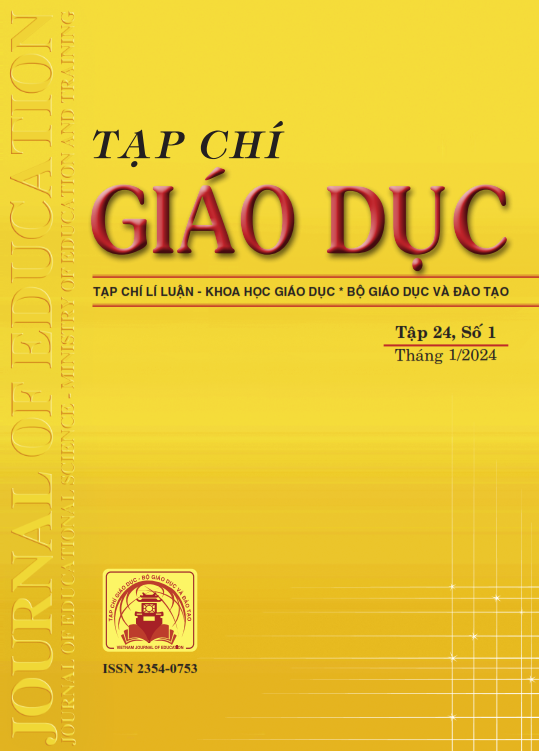Quy trình thiết kế trò chơi nhận thức hỗ trợ sinh viên học tập các học phần đại cương
Tóm tắt
In teaching, cognitive games are commonly used through learning activities that require participants to mobilize cognitive functions, make cognitive efforts, and perform cognitive actions to conduct game tasks, observe the rules and regulations of the game, fulfill the requirements and goals of the game, thereby uncovering target knowledge in the game; at the same time improving and developing their cognitive capacity as well as their learning achievements. Therefore, it can be seen that the use of cognitive games to support learning is a beneficial teaching technique that should be promoted. The article outlines the requirements and implementation process for designing cognitive games to support integrated learning for students. The research results are meaningful to help researchers and lecturers have more options in using a variety of teaching methods for general-knowledge courses to create students’ interest in learning and contribute to improving learning efficiency.
Tài liệu tham khảo
Abbott, D. (2019). Modding Tabletop Games for Education. In: Gentile, M., Allegra, M., Söbke, H. (eds) Games and Learning Alliance. GALA 2018. Lecture Notes in Computer Science (pp. 318-329). Springer, Cham. https://doi.org/10.1007/978-3-030-11548-7_30
Alexander, S. V., Sevcik, R. S., Hicks, O., & Schultz, L. D. (2008). Elements - A Card Game of Chemical Names and Symbols. Journal of Chemical Education, 85(4), 514-515. https://doi.org/10.1021/ed085p514
Carney, J. M. (2014). Retrosynthetic Rummy: A Synthetic Organic Chemistry Card Game. Journal of Chemical Education, 92(2), 328-331. https://doi.org/10.1021/ed500657u
Đặng Thành Hưng (2002). Dạy học hiện đại: Lí luận, biện pháp, kĩ thuật. NXB Đại học Quốc gia Hà Nội.
Guardiola, E. (2016). The Gameplay Loop: A Player Activity Model for Game Design and Analysis. Proceedings of the 13th International Conference on Advances in Computer Entertainment Technology, (pp. 1-7). Association for Computing Machinery. https://doi.org/10.1145/3001773.3001791
Kirikkaya, E. B., Iseri, S., & Vurkaya, G. (2010). A Board Game about Space and Solar System for Primary School Students. Turkish Online Journal of Education Technology, 9(2), 1-13.
Krathwohl, D. R. (2002). A Revision of Bloom’s Taxonomy: An Overview. Theory Into Practice, 41(4), 212-218. https://doi.org/10.1207/s15430421tip4104_2
Lim, T., Louchart, S., Suttie, N., Ritchie, J. M., Aylett, R. S., Stanescu, I. A., Roceanu, I., Martinez-Ortiz, I., & Moreno-Ger, P. (2013). Strategies for Effective Digital Games Development and Implementation. In Cases on Digital Game-Based Learning (pp. 168-198). IGI Global. https://doi.org/10.4018/978-1-4666-2848-9.ch010
Nguyễn Thị Bích Hồng (2014). Phương pháp sử dụng trò chơi trong dạy học. Tạp chí Khoa học, Trường Đại học Sư phạm Thành phố Hồ Chí Minh, 54, 174-179.
Papastergiou, M. (2009). Digital Game-Based Learning in high school Computer Science education: Impact on educational effectiveness and student motivation. Computers and Education, 52(1), 1-12. https://doi.org/10.1016/j.compedu.2008.06.004
Schrier, K. (2016). Knowledge games: How playing games can solve problems, create insight, and make change. Baltimore, MD: Johns Hopkins University Press.
Sherry, J. L., & Pacheco, A. (2006). Matching Computer Game Genres to Educational Outcomes. https://www.academia.edu/2747736/Matching_computer_game_genres_to_educational_outcomes
Siegler, R. S., & Ramani, G. B. (2008). Playing linear numerical board games promotes low-income children’s numerical development. Developmental Science, 11(5), 655-661. https://doi.org/10.1111/j.1467-7687.2008.00714.x
Trần Thị Ngọc Trâm (2003). Thiết kế và sử dụng trò chơi học tập nhằm phát triển khả năng khái quát hóa của trẻ mẫu giáo lớn (5-6 tuổi). Luận án tiến sĩ Giáo dục học, Viện Khoa học Giáo dục.
van Ditmarsch, H. (2000). Knowledge games. Ph.D. Thesis, University of Groningen.
Tải xuống
Đã Xuất bản
Cách trích dẫn
Số
Chuyên mục
Giấy phép

Tác phẩm này được cấp phép theo Ghi nhận tác giả của Creative Commons Giấy phép quốc tế 4.0 .












